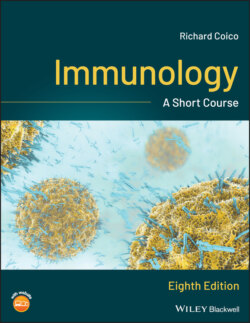Читать книгу Immunology - Richard Coico - Страница 124
REVIEW QUESTIONS
ОглавлениеFor each question, choose the ONE BEST answer or completion.
1 A large glycoprotein has been enzymatically digested in the laboratory to yield a mixture of glycopeptides ranging in size from 4 to 6 amino acids in length. Which of the following would be expected if the peptide mixture were administered to an experimental animal together with an adjuvant such as complete Freund’s adjuvant?Peptide‐specific antibodies would be generated using the peptide mixture alone.Carbohydrate‐specific antibodies would be generated only if an adjuvant were administered with the peptide mixture.peptide‐specific antibodies would be generated only if they were injected with a separate uncoupled protein carrier.Peptide‐specific and carbohydrate‐specific antibody and T‐cell responses would be generated using the peptide mixture alone.There would be neither a humoral nor cell‐mediated immune response to the peptides in the mixture.
2 The protection against smallpox virus infection afforded by prior infection with cowpox virus represents:antigenic specificityantigenic cross‐reactivityenhanced viral uptake by macrophagesinnate immunitypassive protection
3 Converting a toxin to a toxoid:makes the toxin more immunogenicreduces the pharmacological activity of the toxinenhances binding with antitoxininduces only innate immunityincreases phagocytosis
4 Haptens:require carrier molecules to be immunogenicreact with specific antibodies when homologous carriers are not employedinteract with specific antibody even if the hapten is monovalentcannot stimulate secondary antibody responses without carriersall of the above
5 An adjuvant is a substance that:increases the size of the immunogenenhances the immunogenicity of haptensincreases the chemical complexity of the immunogenenhances the immune response to the immunogenenhances immunological cross‐reactivity
6 A polyclonal antibody made against a large protein antigen reacts with it even when it is denatured by disrupting all disulfide bonds. A monoclonal antibody against the antigen fails to react with it when it is similarly denatured. The most likely explanation can be stated as follows.The polyclonal antibody contains antibodies specific for several nonconformational epitopes expressed by the antigen.The monoclonal antibody recognizes both conformational and nonconformational epitopes.The monoclonal antibody is specific for disulfide bonds.The polyclonal antibody has a higher affinity for the antigen.
